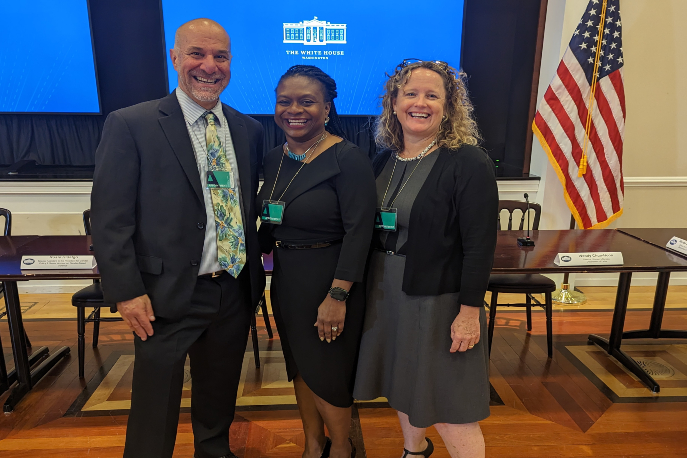In late May, the White House released the first-ever U.S. National Plan to End Gender-Based Violence. We spoke with RALIANCE Policy Director Terri Poore and Research and Evaluation Director David Lee to get their takes on the importance of this first-of-its-kind action and how its strategy will translate to the workplace.
RALIANCE: We understand that this is the first-ever U.S. plan to end gender-based violence. What does this milestone mean to you and the broader movement to prevent sexual violence?
Lee: The National Plan to End Gender-Based Violence establishes a national priority toward addressing and preventing all forms of gender-based violence, including sexual assault, throughout government. The seven pillars of this plan provide a valuable framework to identify the range of strategies needed. The first pillar is prevention, which aligns with the goals of RALIANCE. The National Plan supports work to set up policies, programs, protocols and funding to prevent sexual violence from taking place in the first place.
Poore: I have to start by commending the leadership of Rosie Hidalgo and Carrie Bettinger-Lopez with the White House Gender Policy Council, whose vision really brought the National Plan into reality. They saw the importance of a National Action Plan in being leaders around ending gender-based violence, in terms of both our national and international work. It was so exciting for RALIANCE partners to be part of the National Action Plan from the beginning, including hosting a listening session where advocates from around the country were able to provide input, as well as being at the White House for the unveiling of the plan in May.
The plan is a great example of our RALIANCE values that prevention is possible and everyone has a role to play. The whole of government approach really shows that every department and agency of the U.S. government can help address and end gender-based violence.
RALIANCE: The plan also discusses workplace safety and how to improve protections for survivors of sexual assault and harassment in the workplace. What role does the workplace play in efforts to end gender-based violence? Are there specific challenges that are unique to the workplace?
Poore: We know that harassment and other forms of gender-based violence feed off of power balances. Workers are dependent on their jobs for their survival. These dynamics bring some unique challenges to the workplace. That’s why it’s so important that corporate leaders set the right tone.
Lee: Gender-based violence takes places in all settings in our society, and there’s a responsibility for all sectors to address sexual violence. Typically, we have looked to criminal justice to respond. But RALIANCE pushes us to explore how every sector can be involved, from education to sports organizations to the military and faith communities. Workplaces also play an important role in addressing and preventing such violence and harassment. RALIANCE applauds the National Plan for highlighting the need for protections of workers and engaging employers and workers in developing the solutions.
RALIANCE: What are some key takeaways from the report that businesses should keep in mind when they’re working to ensure a safe workplace culture?
Poore: I love that the plan emphasizes the federal government as a model workplace—a place to start—making sure federal workers have the protections and support they need. One example is SAFE days. The federal government is making it a priority for workers to have the option to leave if they need to address issues arising from sexual assault or domestic violence in their own lives. We really think this is something all employers should do, and it’s wonderful that the federal government is setting the example.
RALIANCE: What are some examples of trainings, resources or strategies that organizations can leverage to be part of the solution to prevent gender-based violence?
Poore: As part of the National Plan, the U.S. Department of Labor (DOL) Women’s Bureau announced the 2023 Fostering Access, Rights and Equity (FARE) Grant opportunity in April, which assists underserved and marginalized low-income women workers who have been impacted by gender-based violence and harassment in the world of work (including activities that occur in the course of, are linked with, or arise out of work), and helps them understand and access their employment rights, services, and benefits. These grants provide crucial outreach, education, and improved benefits access.
Lee: The National Plan calls for increased “training for employers on preventing and responding to GBV, including sexual harassment and human trafficking, as well as the risk factors for GBV that disproportionately impact women, girls, and LGBTQI+ individuals, and the higher risks of GBV in certain occupations.” As RALIANCE is a national expert in gender based violence, we look forward to convening industry stakeholders, unions, survivors, and GBV experts to compile sector-specific good practices and guidance for employers to prevent and respond to GBV.
RALIANCE: What advice do you have for survivors of gender-based violence? What advice do you have for those in their support network who want to help them?
Poore: Survivors deserve to be heard and supported along their journey of healing. The National Plan supports important grant programs that can expand survivors’ access to healing services. At the same time, we know that survivors are always listening and leadership matters. That’s one of the reasons why it’s so important for leaders in every sector to make public statements about what they’re doing to end gender-based violence in the workplace. The National Action Plan can be a great guide.
RALIANCE is a trusted adviser for organizations committed to building cultures that are safe, equitable, and respectful. RALIANCE offers unparalleled expertise in serving survivors of sexual harassment, misconduct, and abuse which drives our mission to help organizations across sectors create inclusive environments for all. For more information, please visit www.RALIANCE.org.

